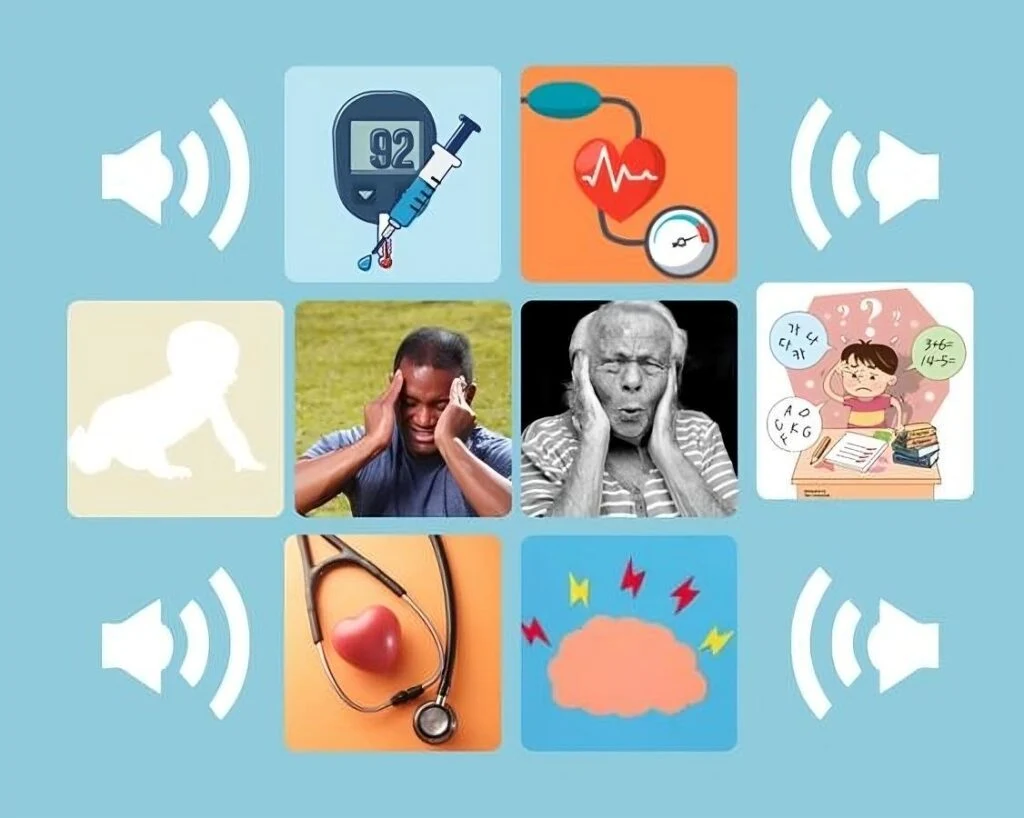In today’s crowded world, we are surrounded by various sounds, from traffic and construction sounds to machinery voices. This type of sound is listened to daily when exposed to a high noise level, which can raise the issue of hearing damage. Noise pollution and ignoring environmental hazards can seriously affect our health, particularly our hearing. At Meenakshi Speech and Hearing Clinic, we are dedicated to giving knowledge or awareness about the impact of noise pollution on hearing and helping you protect your auditory health. In this blog, we can explore the impact of noise pollution on hearing and its damage, or highlight the importance of protecting our ears from noisy environments.
Noise pollution and hearing loss
Noise pollution and hearing loss are closely linked. Protracted exposure to loud noises can damage your ear, resulting in permanent hearing loss. The World Health Organization (WHO) reports that 1.1 million people worldwide are at hearing loss due to unsafe listening practices.
How noise pollution affects hearing
When you listen to long-term music in loud noise, it causes noise-induced hearing loss (NIHL). The delicate hair cells in the inner ear, responsible for translating sound waves into electrical signals for the brain, can be damaged or destroyed by loud sounds. Once these hair cells are damaged, they are never regenerated and become permanent hearing loss.
Key Sources of Noise Pollution
- Traffic Noise: Traffic sound is a major reason for hearing loss or problems in the eardrum, especially in traffic when vehicle sound, engine noise, and tire friction create a constant din.
- Construction Activity: In construction activity, heavy machine sounds, drill machines, and hammers produce a loud noise, which affects your ears or nearby residents and workers.
- Industrial Noise: Factories and manufacturing plants produce loud sounds, which affects the workers hearing over time.
- Household noise: Household activities like using blenders, vacuum cleaners, and loud music can contribute to cumulative noise exposure.
Impact on Hearing Health
- Temporary Threshold Shift (TTS): Short-term exposure to loud noise can cause temporary hearing loss, which is usually recovered after some time or rest in a quiet environment.
- Permanent Threshold Shift (PTS): Continuously listing sounds in loud music can create serious problems that lead to irreversible hearing loss.
- Tinnitus: When in-ear persistent ringing and buzzing, it can result from loud exposure.
- Acoustic Trauma: A sudden, extremely loud sound, like an explosion, can cause immediate and severe hearing damage.
Symptoms of noise-induced hearing loss
Noise-induced hearing loss usually happens normally, so it’s very difficult to understand on short notice. So I am sharing some common symptoms that you understand:
- Difficulty in understanding speech, especially in noisy environments.
- Always a constant ringing or buzzing sound in an ear (tinnitus).
- Need to listen to the high-volume sound of an electronic device.
- A feeling of fullness or pressure in the ears.
Prevention of Noise-Induced Hearing Loss
Preventing NIHL is possible with a few proactive steps:
- Use Ear Protection: Always wear earplugs or earmuffs in noisy environments, listen to music, or use loud home appliances.
- Lower the Volume: When listening to music or watching TV, keep the volume at a safe level. Use noise-canceling headphones to avoid the volume in noisy surroundings.
- Follow the 60/60 Rule: Always limit the volume below 60% of the maximum and use the headphones for 60 min, which is safe for your ear and protects from hearing damage.
- Take Breaks: Take a break between a long time using headphones or listening to a song in loud music to feel safe for your ear or recover.
- Educate Yourself: Be always aware of the noise level that is safe for your ear and also get the knowledge that sound is harmful and prolonged exposure.
Role of Audiologist
Audiologists play an important role in diagnosing and managing noise-induced hearing loss. They conduct a test related to hearing damage and guide a proper, appropriate interference, such as a hearing aid or protective measure. Regular check-ups can help in early detection and prevention of hearing damage.
Conclusion
The impact of noise pollution on hearing is a growing concern that requires everyone’s attention. By understanding the connection between noise pollution and hearing loss and taking a step to protect your ear, which is to reduce the risk of noise-induced hearing loss. Whether at work, at home, or during leisure activities, it’s essential to be mindful of our auditory health and take the necessary precautions to preserve our hearing for years to come.
At Meenakshi Speech and Hearing Clinic, we can offer a comprehensive service related to hearing loss and also guide you on how to protect yourself from noise pollution and what is safe for your ear and prevent hearing loss. To enjoy your quality of life happily.
Contact us today, book an appointment from our website, or call us to learn more about hearing the effects of noise pollution.


